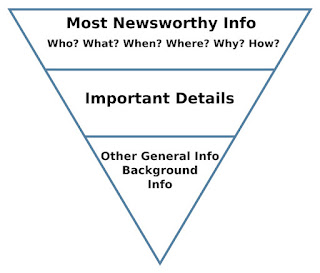New News, Down to business!
At the risk of sounding clichéd, corny and like a brown nose all at once, this lecture quite literally brightened my day. I awoke at 8 am ready for my 9 am lecture, only to realise that this was semester two and my Mondays now commenced at 4 pm with my engaging and brief JOUR1111 lecture ! Such are the joys of choosing the right subjects for once.
The topics of this lecture were:
Web iterations
News under Web 3.0
and the challenges presented by online news.
"Old Media " was the first type of media that we discussed. It encompassed the pre-web period of newspapers, tv, magazines and radio. It's currently being overtaken and shut out by the dominance of new media. I feel that there is a certain degree of melancholy to this situation. That the traditional appeal of a broad leaf newspaper or the routine of sitting in front of the television every evening to watch the news is being foregone for the ease of a few mouse clicks on their online alternatives.
We then covered how the web and its uses have changed through its three distinct periods;
Web 1.0
Web 2.0
Web 3.0
What I gleaned from this lecture was that web 1.0 was primarily just information. It was mass media aimed at the general population. Not targeted nor refined it was primarily focused on companies. It was an extension of old media, an online information source surrounded by advertisements and and comparable experience regardless of the user. So at this point the web hadn't yet totally killed old media. Well done to the web, still possessing some integrity. So far no instagram pictures of peoples breakfasts.
And so things progressed, web 2.0 was born.
Web 2.0 is all about interactiveness. It is the result of the over obsession with the all encompassing social knowledge that we now desire. There is no longer a clear line between the producer and the consumer of information. The term "produser" is coined. I think this is where we began to descend towards the terrible stage of irreversibly pointless contributions to the internet. People tweeting" Good morning everybody" became an acceptable piece of information to be on the worldwide web. I think this is where we lost the plot.
So we finally reach the point we are at now. The semantic web. Web 3.0
Web 3.0 is the web of the individual. The process of meta-tagging is introduced. This is a html tag that can tell what you individually search for and do on the internet. The web tailors its advertising for your personal interests. You no longer experience what others do on the internet because the web is tailored to your needs. Cool right? Wrong. At least in my opinion. I use the internet to expand my knowledge, to browse and be confronted by new interests and news sources. I don't want to be shut into a bubble of what the web decides I would like to look at. The semantic web is in my opinion a breeding ground for gross ignorance and hyperlocalisation of news.
Imagine this, the web realises from my facebook friends, and my web searches and my use of google maps that I, reside in Brisbane. It then decides that I don't need to know about the earthquake in Japan, that is on the other side of the world after all. Is it up to the web to decide that? No . This is just my opinion of course, but then its my blog, so there.
 |
| What would our old media predecessors have thought? |







